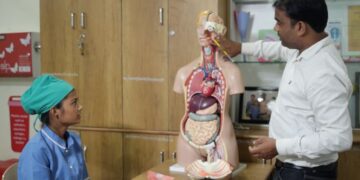The Ministry of Education celebrated the 4th anniversary of the implementation of the National Education Policy 2020 with launch of several new initiatives along with Akhil Bhartiya Shiksha Samagam (ABSS) 2024 in New Delhi on July 29.
The two junior ministers in the Ministry of Education, Jayant Chaudhary and Dr. Sukanta Majumdar along with Secretary, Department of Higher Education, K. Sanjay Murthy, Secretary, DSEL, Sanjay Kumar, Vice Chancellors of the universities, academicians, and some students attended the event. In a striking departure from the past, the ABBS, saw a scale down with no show from the Prime Minister, who had addressed it on at least two occasions. Education minister too gave it a miss in person.
The Ministers launched NEP 2020 initiatives that included Dedicated TV Channels to facilitate learning of various Indian languages, a Tamil Channel; Primers for early graders in 25 Indian languages in pursuance to 54 already done; 10 Bagless days Guidelines aimed to transform learning into a fun, stress-free experience in schools; Career Guidance Guidelines, a massive library of over 500 job cards; NMM (National Mission for Mentoring) and National Professional Standards for Teachers (NPST) in Braille and Audio Books; School Innovation Marathon by AICTE, NITI Aayog, and AIM; and a book on Graduation Attributes and Professional Competencies. They also unveiled four books and lecture notes aimed at promoting the Indian Knowledge Systems (IKS) among students and teachers.
In his message, Education Minister Dharmendra Pradhan, said that the four-year journey of NEP 2020 has been about bringing in transformative change in the country’s education system for nurturing a new generation of learners. NEP 2020 stands as a symbol of hope for transforming the learning landscape, harnessing the country’s demographic dividend, empowering the population and driving socio-economic development. He said the implementation of NEP has made learning more vibrant and guided in making the country’s education more futuristic, rooted, global and outcome-oriented. Expressing his gratitude to Prime Minister Shri Narendra Modi, he reiterated his commitment to implement NEP in letter and spirit to make the country a 21st-century knowledge economy.
While addressing the audience Jayant Chaudhary said NEP 2020 has revolutionised the educational landscape and aligned it with the needs of the 21st century. He appealed to states to be a partner in the journey with a collective effort and strategy that will benefit the entire education ecosystem involving students, teachers, administrators, and more.
Dr. Sukanta Majumdar in his address expressed gratitude to Prime Minister Shri Narendra Modi for his farsighted and progressive ideas that shaped the NEP 2020 which embraces the ideal of education as a transformative journey for personal development, beyond making it just a means to obtain certificates. NEP 2020 includes India’s rich heritage, the synthesis of traditional knowledge with modern advancements, and the integration of value education with nation-building at its core, Dr. Majumdar said.
A presentation on Credit accumulation and seamless creditization of all types of learning including skilling by using the Platform of APAAR ID was made at on the occasion.
ABSS 2024 witnessed six thematic sessions on different themes & initiatives of NEP 2020 related to Schools and Higher Education. These are: (i) Importance of Sustainability in Education Curriculum, Job Prospects, Industry-Academia Collaboration; (ii) PM SHRI (School Education & Skilling); (iii) Role of HEIs in promoting STEM & enhancing GER through Vidyashakti; (iv) Equivalence of Curriculum and Assessment across all School Boards; (v) Role of Ranking and Accreditation in Enhancing Quality; (vi) NCF-FS and NCF-SE Salient Features and Implementation Roadmap.
The event was attended by State Education Secretaries, State Project Directors of Samagra Shiksha, SCERT Directors, State Directors of Primary Education and Secondary Education, Chairperson, State School Boards including CBSE, Head of Autonomous Bodies of DoSEL, Regional Officers of CBSE, KVS, NVS, Principals of DIETs and Schools, Students from KV, JNV, CBSE schools, VCs / Directors / Heads of HEIs – 80 from CFIs and 100 from State Universities, State Project Directors of RUSA, Officials of DoSEL, DoHE, MSDE, UGC, AICTE, NETF, NCVET, NIEPA, ICSSR, ICHR, Officials from other Ministries, Heads of CSO, Panelists for the Breakaway sessions etc.














